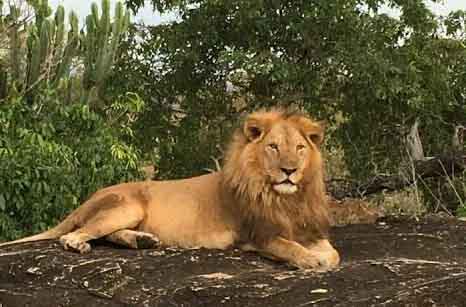
As the world marks World Lions Day today, conservationists are warning that the King of the Jungle may soon be extinct if urgent measures are not taken
Edith Kabesiime, Campaigns Manager at World Animal Protection says:“African lions are facing human and nature induced threats hence the need to prioritize their protection. We have witnessed the population of lions in Africa decline in the last decades as human beings occupy their habitat.”
Statistics from the International Union for Conservation of Nature indicate that Africa’s lion population declined from 200,000 in the last century to the current 20,000.
Lions exist in 26 African countries. The continent has lost about 90 percent of the carnivore from its original habitat.
Kabesiime attributes loss to Climate change, removal from their habitats for entertainment and poaching to satisfy the traditional medicine industry are some of the contributing factors to decline in wild lion populations. She also linked the shrinking of prey base to massive hunting that has increased their risk of death by starvation.
Captive breeding of lions that has intensified in some parts of Africa is also a threat to their survival.
Animal welfare is often not a priority. Lack of adequate basic animal welfare conditions, such as enough water, food, space, shelter and medical care, is sadly a stark reality in most commercial breeding farms. This has been propelled by the urge to make profits through wildlife trade.
African lion has been categorized by the International Union for Conservation of Nature as a vulnerable species amid international trade in its claws, bones and jaws to meet a rising demand for traditional medicine and jewellery.
Wildlife trade is not sustainable. If anything, it is recipe for ultimate extinction and possible outbreak of a future pandemic like what we are experiencing currently.
Animal activists now say that it is essential for an immediate action to be taken to protect and save lions from future extinction. They believe that a ban on international trade in lion’s products coupled with enforcement of laws to deter poaching will help reverse the declining numbers of lions in Africa.
World Animal Protection Country Director Tennyson Williams says policy makers need to consider a total ban on wildlife trade adding that there is need for a coordinated global action to advocate for it as a way of saving Africa’s wild Populations.
“At individual level one should distance themselves from wildlife trade ultimately making it socially unacceptable. If we learn anything from the current situation, it is that we need to leave wild animals where they belong – in the wild. We all have a responsibility to make a shift in our behaviour and attitudes towards animals that could save the lives of lions, other wildlife species, millions of people and our economies,” Tennyson says.
This year’s World Lion Day is marked with an objective of raising awareness of the plight of the lion and the issues that the species faces.
The day is also used as a platform to find ways to protect Lion’s natural environment and also educate people on how to prevent human-wildlife conflicts.







